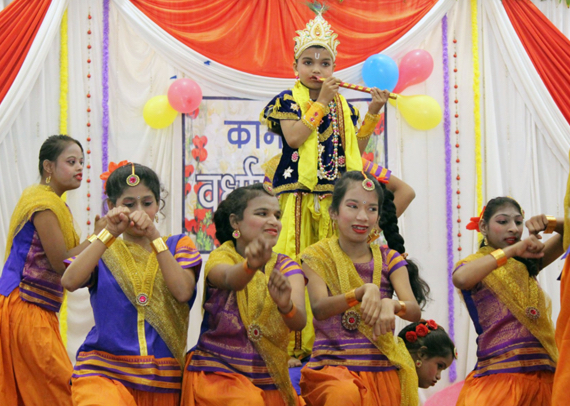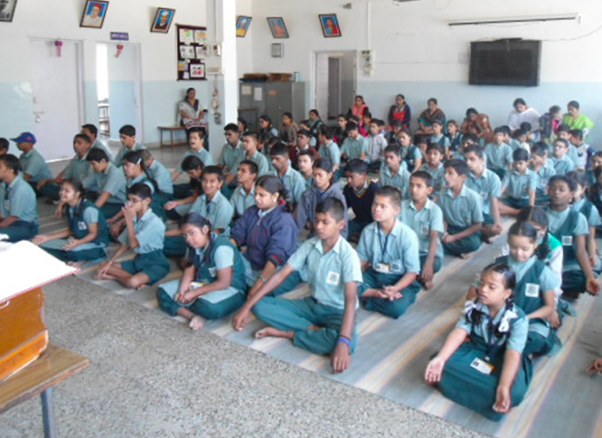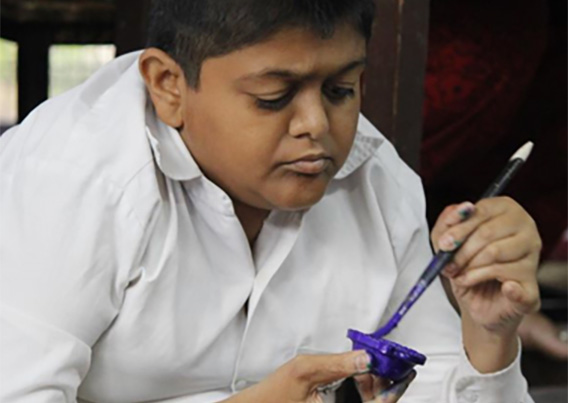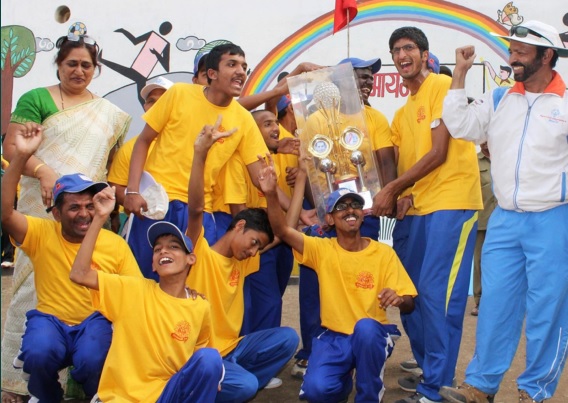AN OVERVIEW
Our primary activities consist of imparting Special Education for the Intellectually Disabled through Schools and Vocational Training through Workshops. The academic activities follow the pattern laid down by the Rehabilitation Council of India (RCI) and the administration follows the Rules and Regulations laid down by the State Government.
RCI draws upon the studies and research carried out in the field of Intellectual Disability by the National Institute for Empowerment of Persons with Intellectual Disabilities (NIEPID). The learning outcome for the Intellectually and Developmentally Disabled (IDD) child is set as Functional Independence. This means the child should be taught basic skills like reading, writing, personal care activities and basic vocational skills, like simple manual activities done in homes.
Today we offer testing, counselling, guidance and support to parents of children with IDD in our Early Intervention Centre. The age group is 0 to 6 years.
For children with IDD in the age group 6 to 18 years, our Schools offer education at three levels, primary, secondary and pre-vocational levels. Besides basic reading, writing and personal care skills they are also encouraged to develop skills in arts, crafts and sports. Here the premise is that there are multiple forms of intelligence. A child with intellectual disability may have good aptitude for musical, visual, kinesthetic and naturalistic abilities.
After the age of 18, when the physiological development has reached a certain stage, the students are encouraged to learn vocational skills, which can get them meaningful work engagement in a sheltered or open environment. Here our workshops provide training in operation of simple machines like Paper cutting, Paper Shredder, Sewing machines, and Handlooms. Students also take part in paper cutting and making of stationery items like files, and scribble pads.
Our Work

Schools
We run 3 schools for children age group 6 to 18 in Pune. Here academic and life skills training for daily living are taught together. Children compete in various co-curricular activities in and outside the schools also.
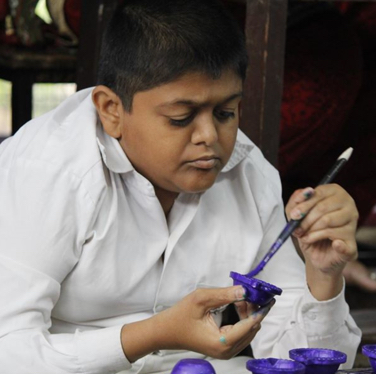
Vocational training workshops
After completing 18 years, students can move to the Vocational Training Workshop of Kamayani. Our 3 workshops at Gokhale Nagar, Nigdi and Talegaon provide training in diverse activities ranging from handlooms to stitching to growing vegetables.
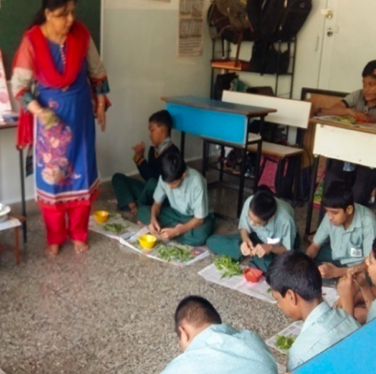
Early intervention centre
Kamayani’s EIC has been functional since 2017 to guide parents regarding steps to be taken to deal with the intellectual disability of their child in age group 0 to 6. Guidance consists of testing, counseling, medical treatment, speech- and physio-therapy.
Schools
Initially the activity started as a Vocational training centre or Udyog Kendra, but soon it was realised that some basic education was necessary to make the Intellectually Disabled children self-reliant in daily living activities. So the centre became a School for the Mentally Handicapped. By 1978 the strength increased to 100 students.
In 1979, the government of Maharashtra offered a two and a half acre plot in Gokhalenagar on lease. The school building was designed by Architect Vaikunth Sardesai, who was then the Principal of Abhinav Kala Vidyalaya’s School of Architecture. Architect Sardesai offered his services pro bono. The building, funded equally by the Central Government and Kamayani, came up in 1982 in two wings housing the School and the Vocational Training Workshop, respectively.
All students learn life skills, which includes skills for taking care of personal hygiene, washing utensils and clothes, ironing, cleaning rooms, cutting vegetables, reading newspapers, buying items of daily necessities and so on.
Kamayani School for Mentally Handicapped at Gokhale Nagar today has a strength of 120 for children age group 6 to 18.
Kamayani Vidya Mandir, Nigdi started a decade later in 1992 in its own building on a plot leased in the Pimpri Chinchwad New Township Development Authority, known as Pradhikaran. It has a strength of 100 and is now planning an addition of 50 by constructing additional 2000 sq ft.
Both these schools have received grants in aid from the Government of Maharashtra.
Sindhutai Joshi Udyog Kendra, Talegaon is set up on a piece of land, given in gift by Mr Kshirsagar of Talegaon. It is situated on the Mumbai Pune Road opposite Talegaon Police Station. It started functioning in 2016 and currently has 27 students on roll. The plan is to expand it to 50 to cater to mainly the rural population. This centre functions on No Grant basis, i e, it is funded by Kamayani through its own funds.
Vocational Training Workshops
After completing 18 years, students can move to the Vocational Training Workshops of Kamayani. Our 3 workshops at Gokhale Nagar, Nigdi and Talegaon provide training in a diverse range of activities
Kamayani Udyog Kendra, Gokhale Nagar
It has a strength of 100 and permission is being sought for an additional strength of 50, currently. Following skills are learned and items produced:
Handlooms and Stitching like napkins, towels, bed covers etc.
Book Binding, Candle and Chalk Making
Seasonal items: Rakhi, Ganapati idols, Rangoli, Paper lanterns, Chakali bhajani (roasted mixed lentil flour), and Greeting cards.
Soaps – Detergents, Utensils washing powder, Liquid soap, Neel (liquid whitener) and Phenyl.
Kamayani Udyog Kendra, Nigdi
It is a Vocational Training workshop in the same campus as the School. It was established as a No Grant workshop in 2004 and has a strength of 50 today. All expenditure is met through Kamayani’s own funds.
They learn vocational skills like growing vegetables in the greenhouse, paper shredding. making notepads, books, files and paper bags, candle making and seasonal items like Rakhi and Ganpati idols.
Sindhutai Joshi Udyog Kendra, Talegaon
It started functioning in 2016. This centre functions on No Grant basis, i e, it is funded by Kamayani through its own funds
Young adults in and around Talegaon attend this Centre.
They learn simple vocational skills like gardening, paper shredding and handicrafts, paper bags, stitching of napkins…
Early Intervention Centre
Kamayani’s EIC has been functional since 2017 to guide parents regarding steps to be taken to deal with the intellectual disability of their child in age group 0 to 6. Guidance consists of testing, counseling, medical treatment, speech- and physio-therapy.
Early intervention refers to a wide range programmes of support to children, parents and families during pregnancy, infancy and early childhood. The whole idea is to ensure that there are no birth defects and where they occur, their impact on development of the child is minimal. According to neuro-biological research, early experiences and stimulation are critical for optimal brain development of a child, suggesting that early intervention has the most critical impact.
It takes time to detect intellectual disability and great mental preparation on the part of parents to accept the presence of such disability in their child. If this time is not lost, the child can be conditioned to learn simple things which make life easier. Efforts at improving speech and physical movements through therapy are very important at this stage, as these are the foundations for further learning in life.
Kamayani has honorary consultants in Pediatrics, Speech Therapy, Physiotherapy and Counseling attending to the children and the parents at the Early Intervention Centre on fixed days in a week. This centre runs entirely on funds raised by Kamayani Society.
Research at Kamayani
Our field is Applied research in Social Sciences. As newer possibilities emerge on the technological front promising better modes of training and better avenues of participation and inclusion, it becomes necessary to study, test and devise improved methods of communication, training and counseling of students and their parents.
The broad objective of our research is to help in selecting, developing and evaluating strategies for effective training and rehabilitation of persons with Intellectual and Developmental Disabilities. The scope of research extends to training and education of persons with IDD, members of their families, teachers trained in special education, orientation of prospective employers & colleagues, children & teachers of regular schools
and members of civil society.
Priority areas in our field of research on Rehabilitation of persons with IDD are:
- 1. Generating early acceptance by parents of the presence of IDD
- 2. Acceptance and management by parents and caregivers of the sexual needs and hygiene of persons with IDD
- 3. Evolving models for post parental care of persons with IDD.

Our past research studies include
- i) An Exploratory study of the effect of Functional Skills on Inclusion and integration of children with Intellectual and Developmental Disability in Home environment
- ii) A descriptive study of the nature of Relationship between normal siblings and siblings with Intellectual Disability
- iii) An Exploratory study of the effectiveness of functional skill training on persons with Intellectual and Developmental Disabilities (IDD)
- iv) An Exploratory study of the assessment of Multiple Intelligence in children with Intellectual Disability Read More
- v) An Exploratory study on Menstruation issues, menstrual management and Menstruation Rights of Females with IDD in the special school and Home environs. Read More
- vi) An Exploratory Study of the Factors Affecting Integration and retention of Workers with Intellectual Disability in Formal Work Setup Read More
- vii) An exploratory study of self- injurious and aggressive behaviour (SIB) among the mentally challenged Read More
For more information, contact Dr Asha Deshpande, deshpande.asha@gmail.com

